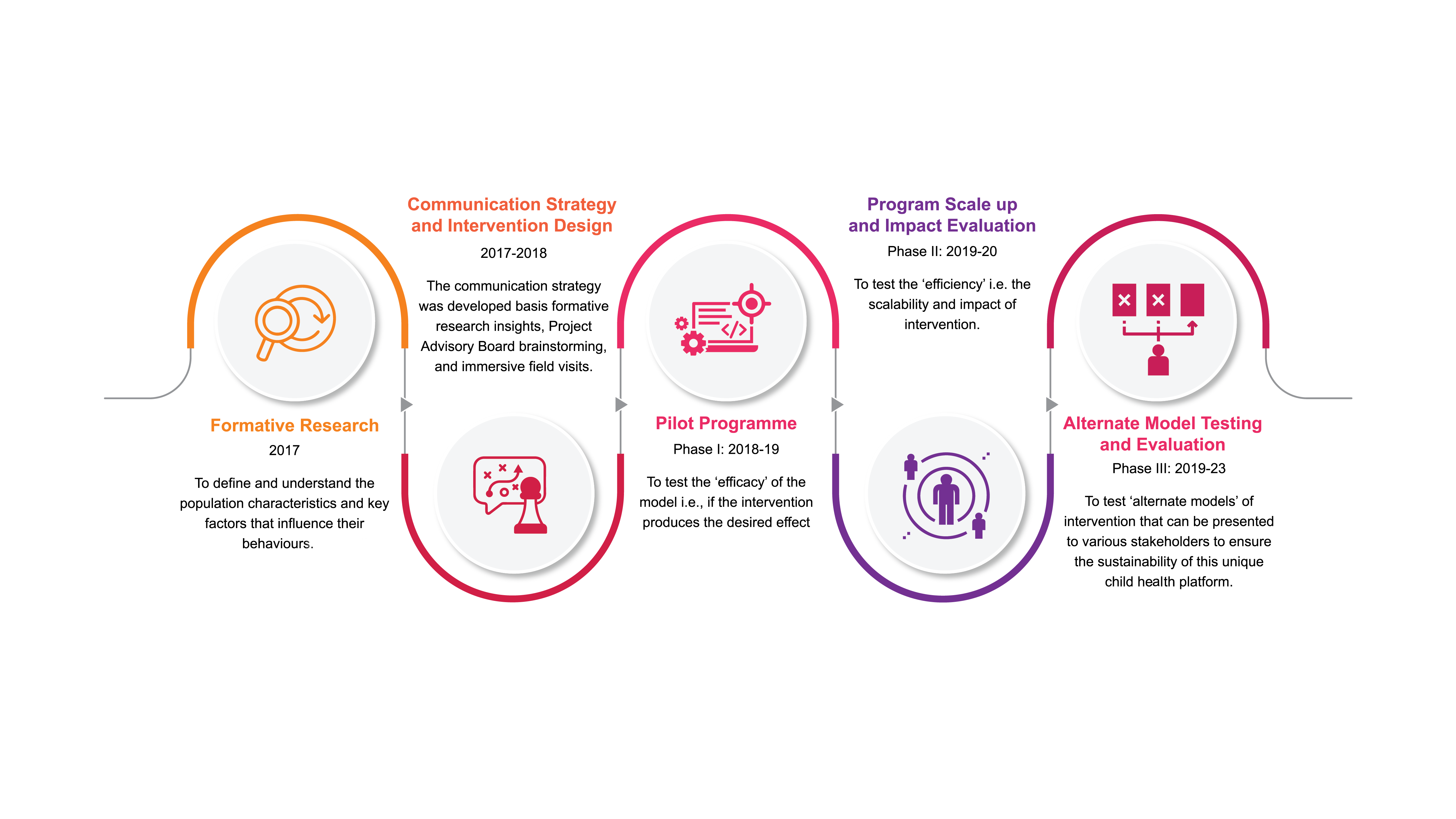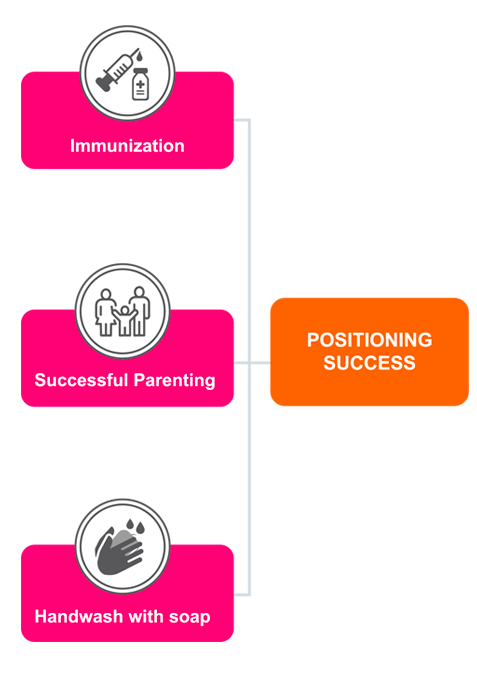Shaping Project Strategy: Insights from Formative Research
Formative research played a crucial role in the Safal Shuruaat project, allowing us to understand the behaviors and beliefs of our target audience and guiding the development of effective interventions. Through a combination of quantitative and qualitative methods such as ethnographic design, focus group discussions, and in-depth interviews, we gathered valuable insights into general healthcare-seeking behaviors, child healthcare practices, handwashing with soap, and immunization behaviors.

The findings from the formative research paved the way for essential recommendations to be incorporated into the design and implementation of interventions to address the identified gaps. HWWS and complete immunization are both crucial practices for promoting child health and development. Reinforcing HWWS during important moments and raising awareness about its preventive benefits against diarrheal diseases and respiratory infections are essential. Simultaneously, emphasizing the importance of complete immunization is equally vital for ensuring children’s survival.
Employ positive messaging, to effectively educate and motivate parents about the benefits of full immunization and encourage the right actions. Moreover, parenting interventions should enhance self-efficacy and go beyond mere survival, envisioning a future where children thrive and achieve success. Empowering parents to take equal responsibility for their child’s health is essential, shifting the locus of control from external service providers to their own determined actions.
Based on these findings and recommendations, the communication strategy, programme framework and creative and intervention design were developed.
Inspiring Action- Communication Strategy for Effective Programme Framework
Bringing two disparate behaviors together.Changing the dialogue from survival to success.

Project Safal Shuruaat’s communication strategy revolves around empowering young parents to unlock their child’s full potential for a successful future. By integrating immunization and handwashing with soap, the project tackles the challenge of balancing these distinct yet essential behaviors.
Recognizing that “every parent dreams of a better life for their child and a better future”, Safal Shuruaat reframes the conversation on child health from mere survival to a pathway to success. It taps into the deep concerns and aspirations of young parents who think beyond themselves, placing their child’s health and future at the forefront.
The project communication strategy highlights the critical importance of early action, as the first few years of a child’s life play a crucial role in their overall development. It is during this pivotal time that protection from infections and diseases becomes paramount. Immunization and handwashing with soap are positioned as powerful, cost-effective tools to protect children from infections and lay the foundation for their age-appropriate growth.
In addition, Safal Shuruaat emphasizes the significance of nurturing a child’s well-being through adequate nutrition, early enrichment activities, and improved parenting skills. By equipping parents with knowledge and resources, the project empowers them to overcome obstacles and take proactive steps towards their child’s success.
Through this comprehensive approach, and building on the cornerstone of ‘Successful Parenting’, Project Safal Shuruaat aims to ignite a sense of hope and possibility in parents, enabling them to provide their children with the best start in life. By embracing these integrated behaviors and support systems, families can create a nurturing environment where their children not only survive but thrive, becoming ready to excel in school and beyond.
The Communication Approach Underpinning Safal Shuruaat’s Intervention Model
Project Safal Shuruaat adopts a robust communication approach aimed at empowering parents, families, and communities to drive sustainable behavior change. Recognizing the vital role of collective efficacy in nurturing successful children, the project tackles barriers at various levels of the socio-ecological system, ensuring progress for parents. This is achieved through the integration of immunization, handwashing with soap, and successful parenting practices, employing a combination of interpersonal, community mobilization, and technology-driven strategies.
At the core of the communication approach is the 5D framework: Depict, Divulge, Demonstrate, Deepen, and Dignify. Each component is designed to address specific objectives and engage the target audience effectively.
Through captivating storytelling, the project depicts the importance of immunization, handwashing, and successful parenting. It then divulges in-depth information and knowledge about these practices. Practical demonstrations and role models are utilized to demonstrate the desired behaviors. The project aims to deepen the commitment by providing ongoing support and resources to parents and influencers within the community. Finally, it dignifies the efforts of parents, families, and communities, recognizing their successes and promoting a culture of respect.
The project employs a multi-touchpoint engagement strategy to sensitise everyone in the community. It reaches out to parents directly through interpersonal communication, community mobilization activities, and technology-driven channels. Influencers within the family and community, including gatekeepers, elder siblings, PRI members, school teachers, healthcare practitioners, retired servicemen, and key opinion leaders, are actively engaged as advocates and change agents. Frontline health workers and primary healthcare system staff are also involved to ensure seamless coordination and support.
A 360° Intervention Design Empowering Behavior Change

The intervention design of Safal Shuruaat adopts a comprehensive 360° approach to address targeted behaviors. Through a combination of interpersonal interactions, community mobilization, and technology-driven strategies, the project aims to persuade the target audience to embrace recommended actions and behaviors in their daily lives.
A key aspect of the design is the adoption of a multi-channel media approach. This approach leverages various communication channels to facilitate desired behavioral change, with a particular emphasis on interpersonal communication (IPC) for interactivity, engagement, and rapid learning.
Executing this design are the Safalta Coaches, male-female communicator duos, who play a crucial role in implementing the intervention. They serve as the primary point of contact for parents in the field, executing interpersonal communication (IPC) sessions and community mobilization activities. With a team comprising both male and female behavior change agents, the Safalta Coaches ensure relatability and effective communication, especially regarding shared parenting and gender roles.
The intervention model encompasses various touchpoints to engage and empower parents. Planned IPC visits offer transformative experiences, incorporating immersive learning, audio-visual films, interactive collaterals, and powerful demonstrations. Mobile reminders act as motivational nudges to sustain behavior change momentum over time. Additionally, frontline health workers, community influencers and elected representatives actively participate to strengthen the support system and promote lasting change.
This holistic approach, executed by the Safalta Coaches and supported by technology-driven efforts, empowers individuals, families, and communities to embrace and sustain positive behaviors for the well-being and development of children.







